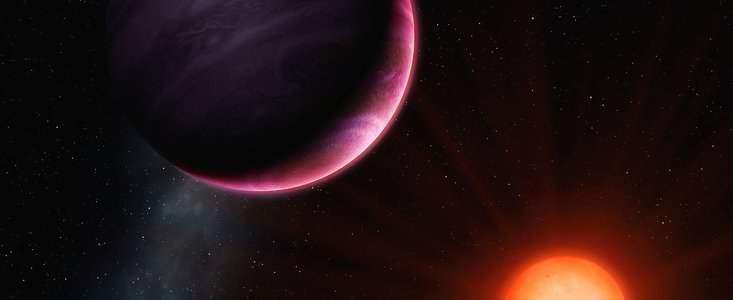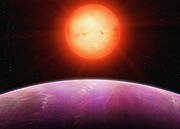Announcement
New Exoplanet Survey Finds its First Planet
31 October 2017
The Next Generation Transit Survey (NGTS) instrument at ESO’s Paranal Observatory in northern Chile has found its first exoplanet, a hot Jupiter orbiting an M-dwarf star [1] now named NGTS-1. The planet, NGTS-1b, is only the third gas giant to have been observed transiting an M-dwarf star, following Kepler-45b and HATS-6b. NGTS-1b is the largest and most massive of these three, with a radius of 130% and a mass of 80% those of Jupiter.
The NGTS uses an array of twelve 20-centimetre telescopes to search for the tiny dips in the brightness of a star caused when a planet in orbit around it passes in front of it (“transits”) and blocks some of its light. Once NGTS-1b had been discovered its existence was confirmed by follow-up observations at ESO’s La Silla Observatory: photometric observations with EulerCam on the 1.2-metre Swiss Leonhard Euler Telescope; and spectroscopic investigations with the HARPS instrument on ESO’s 3.6-metre telescope.
Small planets are relatively common around M-dwarf stars, whereas gas giants like NGTS-1b appear to be rarer around M-dwarfs than they are around stars more like the Sun. This is consistent with current theories of planet formation, but observations of more M-dwarfs are needed before a clear understanding of the numbers of giant planets around them can be arrived at. The NGTS is specifically designed to provide better data on planets around M-dwarf stars, and since they account for around 75% of stars in the Milky Way, studying them will help astronomers to understand the majority population of planets in the Galaxy.
The future could be very exciting for this exoplanet system as it has the potential to be studied in greater detail by the suite of instruments on board the NASA/ESA/CSA James Webb Space Telescope (JWST) which is due to be launched in 2019.
Notes
[1] An M-dwarf is a small, faint star with approximately 8–50% of the mass of the Sun and with a surface temperature of less than 3700°C. 50 of the closest 60 stars to our Solar System are thought to be M-dwarfs, even though not a single one is bright enough to be visible from the Earth with the naked eye.
More Information
This research is presented in a paper entitled “NGTS-1b: A hot Jupiter transiting an M-dwarf”, by D. Bayliss et al., to appear in the journal Monthly Notices of the Royal Astronomical Society.
The team is composed of: D. Bayliss (Université de Genève, Switzerland), E. Gillen (University of Cambridge, United Kingdom), P. Eigmüller (DLR, Germany), J. McCormac (University of Warwick, United Kingdom), R. Alexander (University of Leicester, United Kingdom), D. Armstrong (University of Warwick, United Kingdom), R. Booth (Queen's University Belfast, United Kingdom), F. Bouchy (Université de Genève, Switzerland), M. Burleigh, J. Cabrera (DLR, Germany), S. Casewell, A. Chaushev (University of Leicester, United Kingdom), B. Chazelas, S. Csizmadia, A. Erikson, F. Faedi (University of Warwick, United Kingdom), E. Foxwell (University of Warwick, United Kingdom), B. Gaensicke (University of Warwick, United Kingdom), M. Goad (University of Leicester, United Kingdom), A. Grange, M. Guenther (University of Cambridge, United Kingdom), S. Hodgkin (University of Cambridge, United Kingdom), J. Jackman, J. Jenkins (Universidad de Chile, Chile), G. Lambert (University of Cambridge), T. Louden (University of Warwick, United Kingdom), L. Metrailler (Université de Genève, Switzerland), M. Moyano (Universidad Católica del Norte, Chile), D. Pollacco (University of Warwick, United Kingdom), K. Poppenhaeger, (Queen's University Belfast, United Kingdom; Harvard-Smithsonian Center for Astrophysics, United States), D. Queloz (Université de Genève, Switzerland), R. Raddi (University of Warwick, United Kingdom), H. Rauer (DLR, Germany), L. Raynard (University of Leicester, United Kingdom), A. Smith, M. Soto (Universidad de Chile, Chile), A. Thompson (Queen’s University Belfast, United Kingdom), R. Titz-Weider (DLR, Germany), S. Udry (Université de Genève, Switzerland), S. Walker (University of Warwick, United Kingdom), C. Watson (Queen's University Belfast, United Kingdom), R. West (University of Warwick, United Kingdom) and P.J. Wheatley (University of Warwick, United Kingdom).
Links
- Science paper 1: The Next Generation Transit Survey (NGTS)
- Science paper 2: NGTS-1b: A hot Jupiter transiting an M-dwarf
Contacts
Daniel Bayliss
Department of Physics
University of Warwick
, UK
Tel: +44 (0) 24761 50342
Cell: +44 (0) 7514912757
Email: d.bayliss@warwick.ac.uk
Richard Hook
ESO Public Information Officer
Garching bei München, Germany
Tel: +49 89 3200 6655
Cell: +49 151 1537 3591
Email: rhook@eso.org
About the Announcement
| Id: | ann17076 |
Our use of Cookies
We use cookies that are essential for accessing our websites and using our services. We also use cookies to analyse, measure and improve our websites’ performance, to enable content sharing via social media and to display media content hosted on third-party platforms.
ESO Cookies Policy
The European Organisation for Astronomical Research in the Southern Hemisphere (ESO) is the pre-eminent intergovernmental science and technology organisation in astronomy. It carries out an ambitious programme focused on the design, construction and operation of powerful ground-based observing facilities for astronomy.
This Cookies Policy is intended to provide clarity by outlining the cookies used on the ESO public websites, their functions, the options you have for controlling them, and the ways you can contact us for additional details.
What are cookies?
Cookies are small pieces of data stored on your device by websites you visit. They serve various purposes, such as remembering login credentials and preferences and enhance your browsing experience.
Categories of cookies we use
Essential cookies (always active): These cookies are strictly necessary for the proper functioning of our website. Without these cookies, the website cannot operate correctly, and certain services, such as logging in or accessing secure areas, may not be available; because they are essential for the website’s operation, they cannot be disabled.
Functional Cookies: These cookies enhance your browsing experience by enabling additional features and personalization, such as remembering your preferences and settings. While not strictly necessary for the website to function, they improve usability and convenience; these cookies are only placed if you provide your consent.
Analytics cookies: These cookies collect information about how visitors interact with our website, such as which pages are visited most often and how users navigate the site. This data helps us improve website performance, optimize content, and enhance the user experience; these cookies are only placed if you provide your consent. We use the following analytics cookies.
Matomo Cookies:
This website uses Matomo (formerly Piwik), an open source software which enables the statistical analysis of website visits. Matomo uses cookies (text files) which are saved on your computer and which allow us to analyze how you use our website. The website user information generated by the cookies will only be saved on the servers of our IT Department. We use this information to analyze www.eso.org visits and to prepare reports on website activities. These data will not be disclosed to third parties.
On behalf of ESO, Matomo will use this information for the purpose of evaluating your use of the website, compiling reports on website activity and providing other services relating to website activity and internet usage.
Matomo cookies settings:
Additional Third-party cookies on ESO websites: some of our pages display content from external providers, e.g. YouTube.
Such third-party services are outside of ESO control and may, at any time, change their terms of service, use of cookies, etc.
YouTube: Some videos on the ESO website are embedded from ESO’s official YouTube channel. We have enabled YouTube’s privacy-enhanced mode, meaning that no cookies are set unless the user actively clicks on the video to play it. Additionally, in this mode, YouTube does not store any personally identifiable cookie data for embedded video playbacks. For more details, please refer to YouTube’s embedding videos information page.
Cookies can also be classified based on the following elements.
Regarding the domain, there are:
- First-party cookies, set by the website you are currently visiting. They are stored by the same domain that you are browsing and are used to enhance your experience on that site;
- Third-party cookies, set by a domain other than the one you are currently visiting.
As for their duration, cookies can be:
- Browser-session cookies, which are deleted when the user closes the browser;
- Stored cookies, which stay on the user's device for a predetermined period of time.
How to manage cookies
Cookie settings: You can modify your cookie choices for the ESO webpages at any time by clicking on the link Cookie settings at the bottom of any page.
In your browser: If you wish to delete cookies or instruct your browser to delete or block cookies by default, please visit the help pages of your browser:
Please be aware that if you delete or decline cookies, certain functionalities of our website may be not be available and your browsing experience may be affected.
You can set most browsers to prevent any cookies being placed on your device, but you may then have to manually adjust some preferences every time you visit a site/page. And some services and functionalities may not work properly at all (e.g. profile logging-in, shop check out).
Updates to the ESO Cookies Policy
The ESO Cookies Policy may be subject to future updates, which will be made available on this page.
Additional information
For any queries related to cookies, please contact: pdprATesoDOTorg.
As ESO public webpages are managed by our Department of Communication, your questions will be dealt with the support of the said Department.


